WASHINGTON: Henry Kissinger, a formidable figure in diplomacy whose tenures as a national security adviser and secretary of state under two presidents left an enduring impact on US foreign policy and secured him a contentious Nobel Peace Prize, passed away on Wednesday at the age of 100.
His death, announced by his geopolitical consulting firm, Kissinger Associates Inc., occurred at his residence in Connecticut. The statement did not specify the circumstances surrounding his passing.
A private family service will lay Kissinger to rest, followed by a subsequent public memorial service in New York City.
Active well beyond his hundredth year, Kissinger remained engaged in various activities, attending White House meetings, authoring a book on leadership styles, and providing testimony regarding the nuclear threat posed by North Korea to a Senate committee. In a surprising move in July 2023, he made an unexpected trip to Beijing for discussions with Chinese President Xi Jinping.
Throughout the 1970s, amidst the Cold War, his influential roles as national security adviser and secretary of state under Republican President Richard Nixon positioned him at the heart of numerous pivotal global events.
As a German-born Jewish refugee, Kissinger’s endeavors resulted in significant diplomatic milestones, including the US’s opening to China, landmark arms control negotiations with the Soviet Union, strengthened relations between Israel and its Arab counterparts, and the Paris Peace Accords with North Vietnam.
Although Nixon’s resignation in 1974 amid the Watergate scandal diminished Kissinger’s prominence as the primary architect of US foreign policy, he continued to wield diplomatic influence as Secretary of State during President Gerald Ford’s administration and remained an outspoken figure until his demise.
While lauded for his intellect and extensive experience by many, Kissinger faced criticism, with some labeling him a war criminal due to his support for anti-communist dictatorships, particularly in Latin America. In his later years, his global travels were restricted by efforts from other nations to apprehend or question him regarding past US foreign policies.
The 1973 Nobel Peace Prize, jointly awarded to Kissinger and North Vietnam’s Le Duc Tho (who declined the prize), was among the most controversial awards in history. The selection faced scrutiny as inquiries arose concerning the clandestine US bombing of Cambodia, leading two members of the Nobel committee to resign.
President Ford acknowledged Kissinger’s contributions as a “super secretary of state” while also highlighting his touchiness and unwavering self-assurance, traits that critics often characterized as paranoia and egotism. Ford even remarked, “Henry in his mind never made a mistake.”
Despite his serious countenance and distinctive, gravelly, German-accented voice, Kissinger was perceived as a blend of a scholarly academic and a socialite, often accompanying celebrities around Washington and New York during his bachelor days. He famously asserted that power was the ultimate aphrodisiac.
While outspoken on policy matters, Kissinger remained reticent about his personal life, once likening himself to a solitary cowboy hero riding off alone, as he shared with a journalist.
(Islamabad51_Newsdesk)














